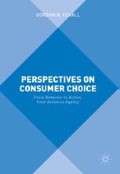Abstract
Cognitive interpretation is further explored in Chapter 9, this time from the standpoint of a macro-cognitive psychology (MaCP)which links the Intentional Interpretation to processes of collective intentionality in which consumers create the contingencies of reinforcement to which they will respond. Chapter 8 set forth the necessity to develop a cognitive psychology that could link the personal level of behavior and intentionality with the sub-personal level of neurophysiological functioning. This chapter is concerned to link the personal level with the super-personal domain of environment-behavior relationships. While Chapter 8 argued that the concerns of MiCP should not obscure the need for understanding at that level to reflect operancy, this chapter brings the behaviors and intentionality that constitute consumer choice at the personal level of exposition firmly into contact with the contingencies of reinforcement that influence them.
The following depiction of a macro-cognitive psychological framework has four elements. First, it traces the development of individual intentionality and collective intentionality as proposed by Tomasello (The cultural origins of human cognition. Cambridge, MA: Harvard University Press, 1999, A natural history of human thinking. Cambridge, MA: Harvard University Press, 2014, A natural history of human morality. Cambridge, MA: Harvard University Press, 2016). Second, it examines Searle’s (The construction of social reality. New York: Free Press, 1995, Making the social world: The structure of human civilization. Oxford: Oxford University Press, 2010a, Consciousness and the problem of free will. In R. F. Baumeister, A. R. Mele, & K. D. Vohs (Eds.), Free will and consciousness: How might they work? (pp. 121–134). Oxford: Oxford University Press, 2010b) argument that social reality might be created via collective intentionality. Third, it expands these insights to deduce implications for the analysis of consumer choice, proposing that the decision perspective of the BPM must incorporate concepts of the symbolic consumer situation and the symbolic pattern of reinforcement. This means that the understanding of rule-governed behavior can be revised in light of these symbolic portrayals of the BPM. Finally, it turns to the evaluation of theories of collective intentionality as MaCP. This means outlining the requirements of metacognitive control proposed by Shea et al. (2014)—that is, distributing metacognitive representations for verbal communication, evaluating metacognitive representations to motivate appropriate action, and extricating metacognitive representations from weak metacognitive information—as they apply to MaCP and, in particular, collective intentionality theories.
Access this chapter
Tax calculation will be finalised at checkout
Purchases are for personal use only
Notes
- 1.
Understood extensionally, tracking is contingency-shaped, reinforced by utilitarian reinforcement, and relies on brute facts. It is not, in this depiction, a matter of constitutive rules or institutional facts. It is behavior generated by the verbal behavior of another. We can only accord it the full status of verbal behavior in the sense that its reinforcement is socially mediated if we make the inference that, by acquiescing to the requirements of the rule, the rule-follower providing himself or herself with informational reinforcement, feedback on his or her own verbally directed performance. We may say this is verbal behavior on the basis that it originates in the words or gestures of another person but, even in a radical behaviorist framework, it can only be thought of as quasi-verbal.
Bibliography
Homans, G. (1951). Social behavior: Its elementary forms. New York: Harcourt, Brace and World.
Searle, J. R. (1969). Speech acts: An essay in the philosophy of language. Oxford: Oxford University Press.
Searle, J. R. (1995). The construction of social reality. New York: Free Press.
Searle, J. R. (2010a). Making the social world: The structure of human civilization. Oxford: Oxford University Press.
Searle, J. R. (2010b). Consciousness and the problem of free will. In R. F. Baumeister, A. R. Mele, & K. D. Vohs (Eds.), Free will and consciousness: How might they work? (pp. 121–134). Oxford: Oxford University Press.
Shea, N., Boldt, A., Bang, D., Yeung, N., Heyes, C., & Frith, C. D. (2014). Supra-personal cognitive control and metacognition. Trends in Cognitive Sciences, 18, 186–193.
Skinner, B. F. (1957). Verbal behavior. New York: Century.
Sprott, J. (1958). Human groups. London: Penguin.
Stanovich, K. E. (2011). Rationality and the reflective mind. Oxford: Oxford University Press.
Tomasello, M. (1999). The cultural origins of human cognition. Cambridge, MA: Harvard University Press.
Tomasello, M. (2014). A natural history of human thinking. Cambridge, MA: Harvard University Press.
Tomasello, M. (2016). A natural history of human morality. Cambridge, MA: Harvard University Press.
Author information
Authors and Affiliations
Copyright information
© 2016 The Author(s)
About this chapter
Cite this chapter
Foxall, G.R. (2016). Consumer Choice as Decision: Macro-Cognitive Psychology. In: Perspectives on Consumer Choice. Palgrave Macmillan, London. https://doi.org/10.1057/978-1-137-50121-9_9
Download citation
DOI: https://doi.org/10.1057/978-1-137-50121-9_9
Published:
Publisher Name: Palgrave Macmillan, London
Print ISBN: 978-1-137-50119-6
Online ISBN: 978-1-137-50121-9
eBook Packages: Business and ManagementBusiness and Management (R0)

